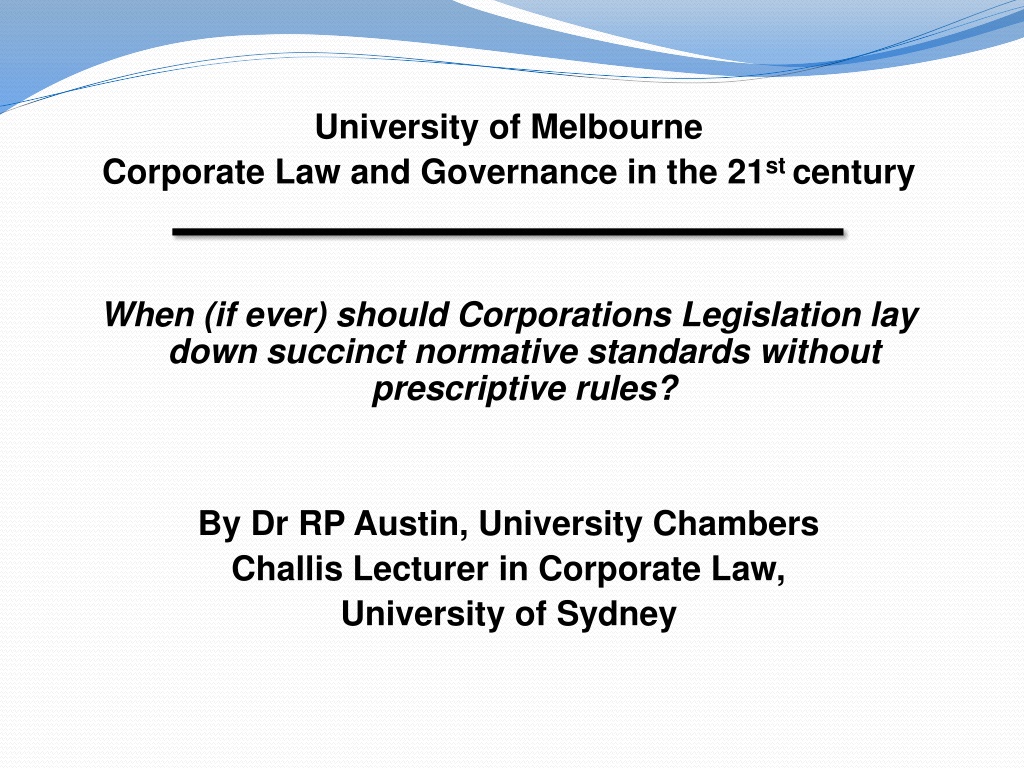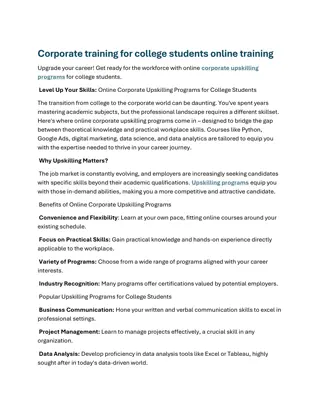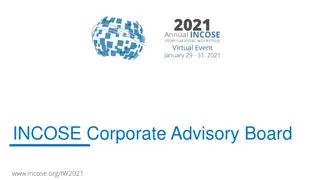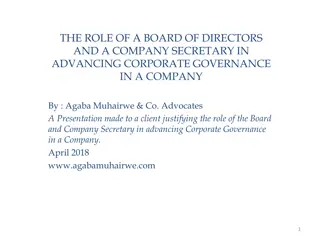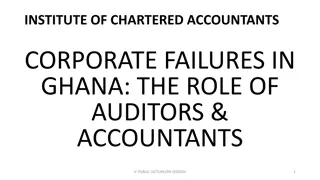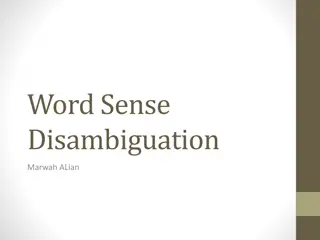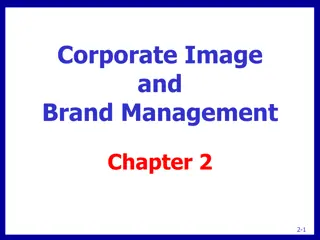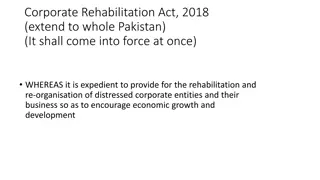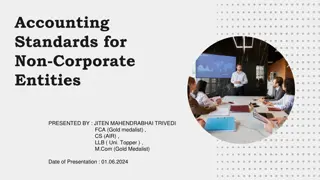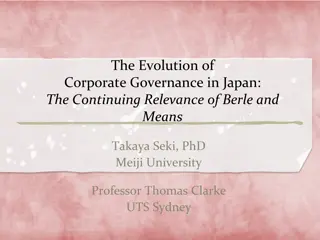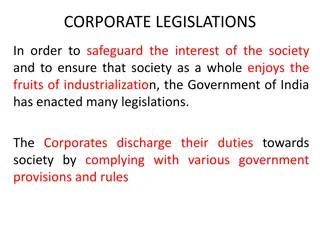Contemporary Approaches to Corporate Legislation Standards
Exploring the necessity of implementing succinct normative standards without prescriptive rules in corporate legislation, this article by Dr. RP Austin from the University of Sydney delves into various aspects of statutory corporate law, such as equality of opportunity, financial services licensee behavior, unconscionable conduct provisions, and directors' duties. Through an in-depth analysis, the author highlights scenarios where setting normative standards proves more effective than rigid rules.
Download Presentation

Please find below an Image/Link to download the presentation.
The content on the website is provided AS IS for your information and personal use only. It may not be sold, licensed, or shared on other websites without obtaining consent from the author.If you encounter any issues during the download, it is possible that the publisher has removed the file from their server.
You are allowed to download the files provided on this website for personal or commercial use, subject to the condition that they are used lawfully. All files are the property of their respective owners.
The content on the website is provided AS IS for your information and personal use only. It may not be sold, licensed, or shared on other websites without obtaining consent from the author.
E N D
Presentation Transcript
University of Melbourne Corporate Law and Governance in the 21st century When (if ever) should Corporations Legislation lay down succinct normative standards without prescriptive rules? By Dr RP Austin, University Chambers Challis Lecturer in Corporate Law, University of Sydney
Introduction My theme is that there are areas of statutory corporate law in which the best approach is simply to state normative standards of behaviour. I will endeavour to identify circumstances in which that approach is appropriate. I will use statutory provisions on the following subjects for the development of my theme: equality of opportunity in corporate control transactions; the requirement that financial services licensees act efficiently, honestly and fairly; unconscionable conduct provisions; the best interests duty for directors and officers.
Equality of opportunity in corporate control transactions (1) Deficiencies of the 1961 State legislation The Eggleston Principles Drafting the national co-operative legislation choosing black-letter law Comparing the London City Panel The emergence of the discretionary override Companies (Acquisition of Shares) Codes
Equality of opportunity in corporate control transactions (2) Anomalies in black letter drafting Takeovers Panel power to declare unacceptable circumstances Further reforms: Eggleston principles become a legislative purpose Sources of law: black-letter rules, regulations, judicial decisions, and ASIC and Panel guidance My assessment: FAIL
Efficiently, honestly and fairly (1) 912A(1)(a): a financial services licensee must do all things necessary to ensure that the financial services covered by the licence are provided efficiently, honestly and fairly (the EHF Standard) A single requirement, or three? A police officer may very well be the most efficient in control of crime if he just shot every suspected criminal on-site . Likewise, a judge could get through his list most efficiently by finding for the plaintiff or defendant as a matter of course Young J, Story v NCSC (1988) 13 NSWLR 661
Efficiently, honestly and fairly (2) The statutory words are a compendious indication meaning a person who goes about their duties efficiently having regard to the dictates of honesty and fairness, honestly having regard to the dictates of efficiency and fairness, and fairness having regard to the dictates of efficiency and honesty Young J, Story v NCSC (1988) 13 NSWLR 661 ASIC v Westpac Securities Admin [2019] FCAFC 187: there may be a breach if a body of deliberate conduct is unfair, though not dishonest (per Allsop CJ); wording of s 912A(1)(a) imposes three concurrent obligations on the licensee.
Efficiently, honestly and fairly (3) Thus, three approaches to construction: (a) Treat the three words as setting out three separate requirements, while insisting the requirements are conjunctive but this would overlook statutory interpretation requirements about context and purpose; (b) Treat the three words as representing a single idea is that what we mean by composite or compendious ? And what is the single idea? (c) The three words lay down a single standard, and the words are conjoined so that each qualifies a potentially brutal literal construction of the other words.
Efficiently, honestly and fairly (4) Conclusion: the EHF standard is an effective normative standard of behaviour; The courts are moving towards a sensible interpretation in which the three component parts of the standard are conjoined and the words interact with each other.
Unconscionable conduct (1) ASIC Act s 12CB(1) prohibits a person, in trade or commerce in connection with the supply or possible supply of financial services to a person from engaging in conduct that is in all the circumstances, unconscionable (also s 21 of Australian Consumer Law) Uncertainty of meaning has constrained the section s efficacy: must the plaintiff establish special disadvantage relied on by defendant? If not, potential application is much broader (Allsop CJ in Paciocco v ANZ (2015) 26 FCR 199 at [296]; Courts are working towards resolution of the problem.
Unconscionable conduct (2) ASIC v Kobelt [2019] HCA 18 - facts ASIC brought proceedings against Mr Kobelt alleging unconscionable conduct under s 12CB(1) High Court dismissed ASIC s appeal by majority of 4 to 3, strictly not necessary to decide whether special disadvantage is required under s 12CB However Edelman, Nettle, Gordon and Gageler JJ supported the view that the special disadvantage requirement in equity did not apply to s 12CB
Unconscionable conduct (3) ACCC v Quantum Housing Group [2021] FCAFC 40 Here it was necessary for the court to decide whether a finding of special disadvantage and taking advantage was required Full Federal Court (Allsop CJ, Besanko and McKerracher JJ) unanimously held that no finding of special disadvantage is necessary for a finding of statutory unconscionable conduct under s 21 of the ACL Strong judgment, likely to be followed
Unconscionable conduct (4) Stubbings v Jams 2 Pty Ltd [2022] HCA 6 - facts High Court unanimously allowed Stubbings appeal and held that the respondent engaged in unconscionable conduct according to equitable principles the facts showed that the respondent s conduct amounted to wilful blindness and so the respondent was fixed with the knowledge it would have obtained from making enquiries Gordon and Steward JJ also found that the respondent s system of conduct was contrary to s 12CB
Unconscionable conduct (5) Stubbings v Jams 2 Pty Ltd [2022] HCA 6 (continued) Gordon J supported the view that special disadvantage need not be proved under s 12CB, though it was unnecessary to decide that point Conclusion regarding unconscionable conduct Statutory unconscionable conduct is a very good example of a normative standard of behaviour enacted in legislation, and the recent cases indicate that the courts are at last making progress in defining its metes and bounds
Directors and Officers best interests duty (1) Section 181(1)(a): a director or other officer of a corporation must exercise their powers or discharge their duties in good faith in the best interests of the corporation Is the duty objective or subjective? We don t yet have a definitive answer but case law and academic writing is indicating that the duty incorporates a subjective standard requiring the directors to decide on best interests, and an objective standard entitling the court to find that the director s decision is one that no reasonable director would consider to be in co s interests (see article by Langford & Ramsay ((2014) JBL 173)
Directors and Officers best interests duty (2) Whose interests are identified by the phrase interests of the corporation ? Until recently the orthodox answer was that the interests to be considered were those of the members Some years ago JD Heydon and Neil Young QC in separate presentations noted that the statutory language refers to the interests of the corporation, permitting directors to prefer other stakeholders over members if the corporation would benefit Very recently, Professor Langford has written that the best interests duty often requires directors to at least consider stakeholder interests
Directors and Officers best interests duty (3) I predict that these academic writings will eventually contribute to definitive court judgments allowing directors to benefit non-member stakeholders if the company s best interests are served by doing so; In that way Australian corporate law will accommodate stakeholder interests without any statutory amendment being needed Compare s 172(1) of the Companies Act 2006 (UK), which has replaced the statutory best interests duty with a statutory duty of directors to promote the success of the company
Directors and Officers best interests duty (4) Companies Act 2006 (UK), s 172(1): A director of a company must act in the way he considers, in good faith, would be most likely to promote the success of the company for the benefit of its members as a whole, and in doing so have regard (amongst other matters) to (a) the likely consequences of any decision in the long- term, (b) the interests of the company s employees, (c) the need to foster the company s business relationships with suppliers, customers and others,
Directors and Officers best interests duty (5) Companies Act 2006 (UK), s 172(1) (continued): (d) The impact of the company s operations on the community and the environment, (e) The desirability of the company maintaining a reputation for high standards of business conduct, and (f) The need to act fairly as between members of the company. The drafting of s 172(1) has attracted criticisms from commentators including the authors of Gower s Modern Company Law and Buckley on the Companies Act
Directors and Officers best interests duty (6) Conclusion regarding the best interests duty If, as I anticipate, Australian courts will eventually recognise that the best interests of a business corporation include considering and balancing the interests of members with the interests of other stakeholders and the interests of community in which the company does business, Australia would have achieved an outcome of the kind sought by the drafters of s 172(1) without the problems of statutory construction produced by that enactment. Concurrently, Australian courts and academics are making progress towards resolving long- standing uncertainties regarding the nature of the best interests duty.
Conclusion (1) I began this presentation by asking when (if ever) corporations legislation should lay down succinct normative standards without prescriptive rules. My first example, concerning equality of opportunity in corporate control transactions, gives a reasonably strong indication that in a commercial setting, it is likely to be unsatisfactory to use detailed black-letter rules to give effect to a normative standard of behaviour without articulating that standard in the rules. The consequences in that case included massive complexity and multiple sources of relevant rules.
Conclusion (2) In contrast, my second example (the efficiently honestly and fairly standard for providers of financial advice) legislates the normative standard of behaviour in simple language, and at last the courts appear to be clarifying the main debated issue of interpretation. My third example (unconscionable conduct) is also a case where the normative standard has been enacted and the courts are at last clarifying its scope, particularly by excluding from statutory unconscionability the requirement of the equitable version that special disadvantage and the taking of advantage must be proven.
Conclusion (3) My final example (the best interests duty of directors and officers) is interesting because our normative standard appears to be moving its foundation as courts and commentators come to develop their ideas about the best interests of a business corporation, as opposed to the members who invest in it. Placing a normative standard of behaviour in legislation is a bold move that will never produce a perfect outcome. There will always be elements of uncertainty when brief and general language is used. But my first example shows in a quite devastating way what is likely to happen, in legislation regulating commercial activity, when regulation proceeds by black-letter rules.
